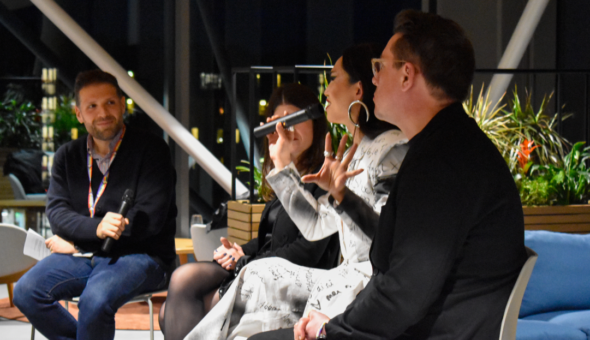To mark the UN International Day of Women and Girls in Science, we spoke with Professor Orietta Marsili about the School of Management’s Athena SWAN accreditation. The International Day of Women and Girls in Science is an opportunity to celebrate the contribution of women and girls in a historically male field, as well as promote initiatives that encourage gender equality in the sciences. The Athena SWAN Charter has the same goals – to encourage gender inclusivity within higher education and research.
What is the Athena SWAN?
It’s a framework set up to advance gender equality in universities. SWAN stands for Scientific Women’s Academic Network – when it was first established in 2005, it focused on supporting the careers of women in science, technology, engineering, maths and medicine (STEMM) in higher education and research. In 2015, this was expanded to include other academic disciplines in arts, humanities, social sciences, business and law, as well as others in the University community like professional and support staff. At this point, they also expanded their definition of gender to include transgender staff and students.
As time has gone on the focus has shifted, to look at inclusion in a more intersectional way. The only way to promote equality is to be aware that the obstacles don’t present in the same way to all women. Because of their background, because of socio-economic status, because of culture or religion, etc.
What does inclusion mean in practice?
Lots of things. We know that there are proportionately fewer women in STEMM but even in a school of management we know that there are fewer women in positions of leadership. So, inclusion means better training, supporting those returning from a career break, facilitating personal development. It’s about improving access to opportunities by tackling the structures or culture that causes this. It also means looking at the different challenges that women face throughout their career journey, from promotion opportunities to maternity leave, and addressing the ways that this might halt their progression.
Most importantly, the central tenet of the Athena SWAN is that true inclusion is to the benefit of the institution, and even society – the first of the ten principles acknowledges that “academia cannot reach its full potential unless it can benefit from the talents of all”.
How do they aim to remove these obstacles?
The charter is based on ten principles. Universities have to show commitment to these by embedding them into their culture, procedures, policies, and infrastructure. If they do this successfully, they are given an award! But more importantly, if they do this successfully then the barriers to gender equality will hopefully be reduced.
How has the School of Management done?
Well, we were delighted to be awarded the Bronze Award on our first try. It’s quite hard to achieve – only around half the applicants were successful!
The bronze award is about fully assessing the current situation and committing to an action plan. The focus is on data gathering and assessment, with the purpose of informing practices. We gather both quantitative and qualitative data. As well as a staff survey, we undertook focus groups and had many formal and informal conversations because it’s critical to understand how people feel about things. Understanding how to tackle the barriers to gender equality means understanding how they present to different people.
What do you think this means for the School?
It’s a shared vision. It’s not just an award. It’s an ethos. it means that our School – fully supported by the collective leadership - has agreed to embed a culture of inclusion and participation in everything we do. For me, it’s about ownership. It’s getting everyone to think about their practices, their workspaces, their work, how they deal with colleagues, through the lens of the Athena SWAN.
In fact, it touches on so many issues that are priorities for organisations already, like change management or career development. So, it’s a vehicle to think about these important issues a bit differently.
What comes next?
In the next round, we have the option to either apply to have our Bronze award renewed, or to apply for the next level. Our intention is to try for Silver.
The Silver award requires us to demonstrate the impact of our action plan. To do this, we have established an Implementation Committee. We have drawn up themes that we want to look at more closely, which focus on each individual’s journey through the organisation, the challenges they might face at each step and how we can support their development.
Eventually, I hope, we will go for Gold! This wouldn’t imply we were perfect but it would mean that, by demonstrating consistent commitment to equality and inclusion, we can and should also act as a beacon for others.
Photo by Christina @ wocintechchat.com on Unsplash
Respond



